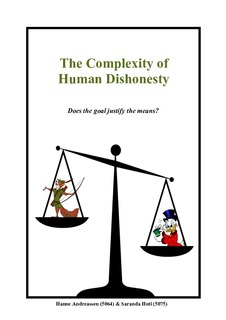| dc.contributor.advisor | Wathne, Kenneth Henning | |
| dc.contributor.author | Andreassen, Hanne | |
| dc.contributor.author | Hoti, Saranda | |
| dc.date.accessioned | 2018-09-18T12:23:45Z | |
| dc.date.available | 2018-09-18T12:23:45Z | |
| dc.date.issued | 2018-06 | |
| dc.identifier.uri | http://hdl.handle.net/11250/2563219 | |
| dc.description | Master's thesis in Business | nb_NO |
| dc.description.abstract | The purpose of this master thesis is to extend the current knowledge on dishonesty by adding a new dimension of cheating on behalf of others - more precisely a charitable cause. Additionally, the aim is to analyse the simultaneous effect on dishonesty of message framing in terms of gains and losses and investigate the impact of a collectivistic or individualistic mind-set on dishonest behaviour. This is a quantitative study, where we conduct a 2 by 2 experimental design with four different treatments – explicitly Charity/Gain, Charity/Loss, Me/Gain and Me/Loss, with a sample size of 120 students at the University of Stavanger. The intention with this thesis is to explore whether people are more willing to behave dishonestly when a charitable cause can reap the rewards of it, compared to oneself, and whether a loss or gain framing promotes cheating more.
The problem statement is formulated in two questions:
Are people more dishonest when the rewards are towards others compared to oneself, and how does message framing in terms of gains and losses affect the level of dishonesty? Does the goal justify the means?
The research questions that will guide the thesis are the following:
1. How much does people cheat when the risk of being caught is seemingly eliminated?
2. Do participants cheat more for a charitable cause, compared to for oneself?
3. How does framing the task in terms of gains and losses affect cheating behaviour?
4. Does a higher degree of collectivism increase the probability of cheating for charity?
The analysis leads to the following summary of findings:
- A significant number of participants cheated, however they did not cheat to the maximal extent.
- The majority of the cheating occurred when the monetary gains were directed towards oneself, as opposed to charity.
- The loss framing triggers cheating to a larger extent than gain framing.
- The framing of gains and losses has no effect when the recipient of the earnings is a charity but turns out to have an effect when the monetary gain is personal.
- The treatment Me/Loss is significantly different from the other treatments and have a significant positive impact on the probability of cheating.
- We find no significant evidence that participants with higher degree of collectivism would cheat more if they get the Charity treatment compared to if they get the Me treatment. A possible explanation for insignificant results can be due to low variation in the data in this sense.
- Conclusively, it appears that people are more willing to take risks and cheat to avoid personal losses rather than benefitting others - thus the goal does not seem to justify the means.
- In total, 3400 NOK was donated to the charity “Barnekreftforeningen” (see Appendix 7). | nb_NO |
| dc.language.iso | eng | nb_NO |
| dc.publisher | University of Stavanger, Norway | nb_NO |
| dc.relation.ispartofseries | Masteroppgave/UIS-HH/2018; | |
| dc.rights | Navngivelse 4.0 Internasjonal | * |
| dc.rights.uri | http://creativecommons.org/licenses/by/4.0/deed.no | * |
| dc.subject | økonomi | nb_NO |
| dc.subject | administrasjon | nb_NO |
| dc.subject | strategi | nb_NO |
| dc.subject | ledelse | nb_NO |
| dc.subject | økonomisk analyse | nb_NO |
| dc.subject | uærlighet | nb_NO |
| dc.title | The Complexity of Human Dishonesty | nb_NO |
| dc.type | Master thesis | nb_NO |
| dc.subject.nsi | VDP::Samfunnsvitenskap: 200::Økonomi: 210::Samfunnsøkonomi: 212 | nb_NO |

